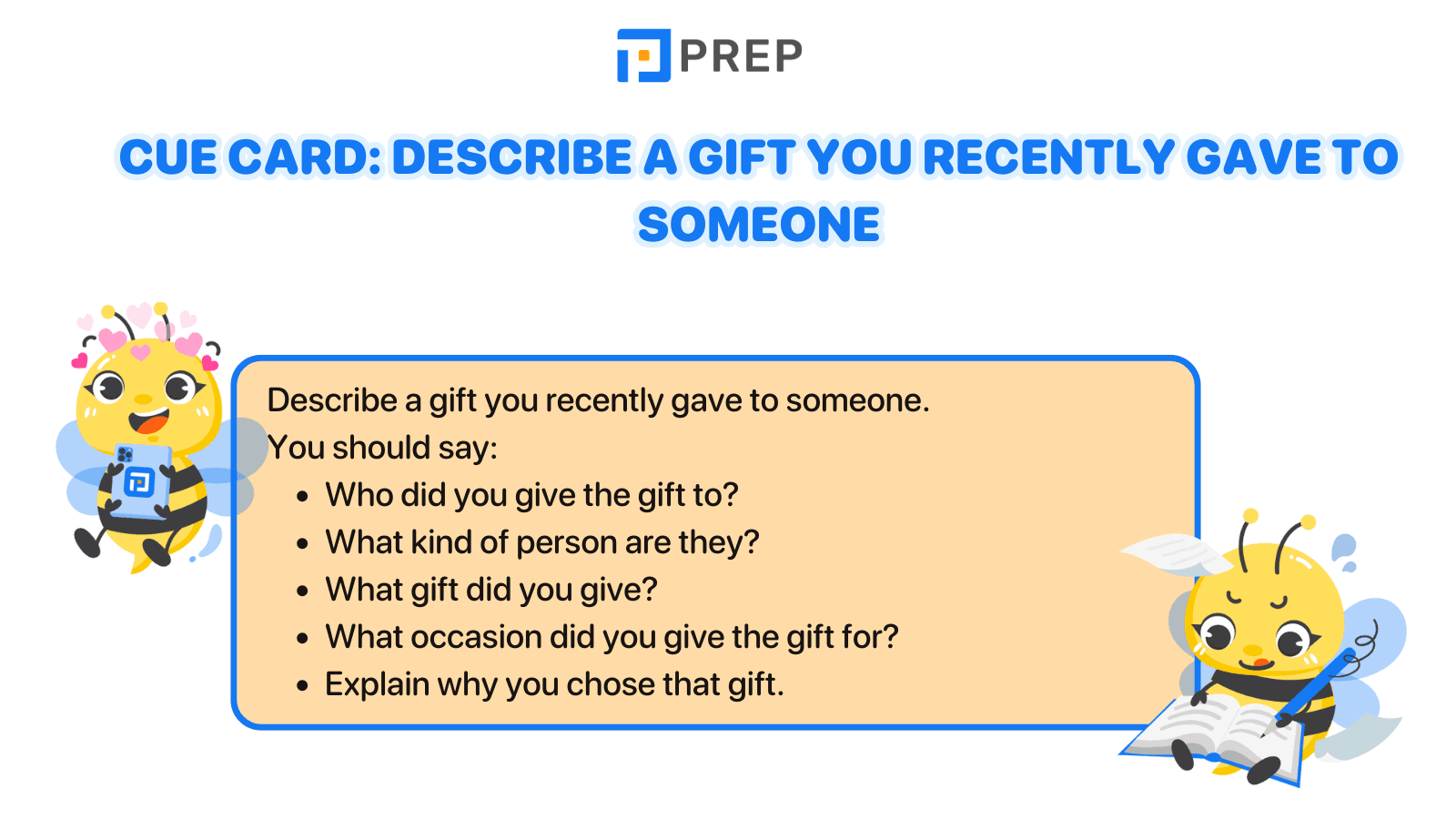Sample IELTS Speaking Part 2, 3: Describe a gift you recently gave to someone
"Describe a gift you recently gave to someone" is an IELTS Speaking Part 2 topic under the theme "Describe an object." It can be said that this is a task that is not too difficult but not too easy either. To handle this task effectively, candidates need to practice and engage in practical exercises during their exam preparation at home. Below is a sample answer written by PREP teachers. Refer to this article to easily achieve a high band score in the real exam!
- I. Sample IELTS Speaking Part 2: Describe a gift you recently gave to someone
- II. Sample IELTS Speaking Part 3: Gifts
- 1. In your country, when (on what occasions) do people give gifts to others?
- 2. What sorts of things do they give?
- 3. Do people today still give the same kinds of gifts that people used to give, many years ago?
- 4. Why do people like to receive gifts?
- 5. Do you think it's suitable to give money as a gift?
- 6. Do you think it's a good idea for people who are doing business with each other to exchange gifts?

I. Sample IELTS Speaking Part 2: Describe a gift you recently gave to someone

1. Cue card: Describe a gift you recently gave to someone
Describe a gift you recently gave to someone:

2. Outline: Part 2
2.1. Idea
-
Describe a gift you recently gave to someone requires the candidate to describe a gift that they have recently given to someone. They need to provide the following information:
-
Who did you give the gift to?
-
What kind of person are they?
-
What gift did you give?
-
What occasion did you give the gift for?
-
Explain why you chose that gift.
-
-
The topic "Describe a gift you recently gave to someone" falls under the broader theme of "Describe an object." To effectively handle the task of describing a gift, the best approach is to closely follow the cues provided in the prompt and provide clear and specific information, avoiding vague descriptions.
-
For the first question in the prompt, who did you give the gift to, it is generally easy to answer. We just need to think about a special occasion where we prepared a gift for a loved one. It could be giving a birthday gift to parents, siblings in the family, or close friends.
-
Next, we need to go into more detail with the second question, what kind of person are they. In this question in the prompt of "Describe a gift you recently gave to someone," we will describe the recipient in more detail. We will describe our relationship with them, their personality, and what makes us cherish them. We don't need to provide excessive details, just presenting them in 3-4 sentences is enough.
-
Following this point, you can answer the third question, what gift did you give. In this aspect, we will focus on describing the gift in more detail. We will describe its appearance, color, shape, design, and functionality.
-
Lastly, but most importantly, in the "Describe a gift you recently gave to someone" prompt, we need to explain the reasons behind choosing that gift. You should spend more time on this question because it is the main content of the prompt. We can mention the personality, the relationship between ourselves and the recipient, and at the same time, try to incorporate our emotions to show dedication and effort in choosing the gift.
2.2. One-minute note taking
|
Who you gave it to |
Best friend/close friend |
|
What kind of person he/she is |
|
|
What the gift was |
|
|
What occasion the gift was for |
|
|
Why you chose that gift |
|
3. Sample IELTS Speaking Topic: Describe a gift you recently gave to someone
Refer to the sample answer for the IELTS Speaking Part 2 topic "Describe a gift you recently gave to someone" below to effectively practice IELTS Speaking at home.
Up till now, I still remember my friend’s cheerful smile and heartfelt appreciation for me when I gave her a small gift on her 18th birthday 4 years ago. At that time, we had been good friends for nearly 8 years and went through many ups and downs in our life having each other. That year was a really significant milestone for both of us so on her birthday, I thought that I would give her something different and special. Actually, my friend is a very down-to-earth person with a big heart and full of positive energy. She has many wonderful personal qualities which make me envy all the time. She is carefree but sensible, humble and has a true goodwill for everyone.
Her birthday was two days after our graduation ceremony - an event marking our maturity and becoming independent adults. I spent nearly a month thinking about what I should give her and finally a company advocating social responsibility with child labor free clothes caught my attention. After much thought, I ordered from that company a cotton graphic T-shirt with embroidered short-sleeves for her. The garment was in milky white made of 100% cotton and very comfy for everyday wear. The most impressive feature of the t-shirt was a printed slogan saying ‘’Heal the world’’ - a renowned single title by Michael Jackson. Apparently, the item was free size and loose fitting over the bust and through the waist so that my friend could make it an item for her daily wardrobe staple.
I reckon that when it comes to choosing a gift, the recipient’s preference and personality should be prioritized over other factors. My friend always showed her strong belief in equality and human rights with a passionate voice whenever we met up. Also, she loves one-of-a-kind clothing items with exotic designs. Lucky for me, the t-shirt not only conveyed a meaningful message but was also pretty reasonably priced.
Four years have passed since the day I gave her that t-shirt and she still kept it in her wardrobe.
Some common vocabulary used in the sample answer for the IELTS Speaking Part 2 topic "Describe a gift you recently gave to someone":
-
Heartfelt (adj): sincere
-
Appreciation (noun): gratitude
-
Down-to-earth (adj): practical
-
Carefree (adj): without worries
-
Humble (adj): modest
-
Sensible (adj): sensitive
-
Have a true goodwill (verb phrase): genuinely care
-
Graduation ceremony (compound noun): the event of completing a course of study
-
Advocate (verb): support, promote
-
Social responsibility: the duty to contribute to the welfare of society
-
Child labor free (adj): not involving the exploitation of child labor
-
Cotton graphic T-shirt (noun phrase): a T-shirt with printed designs made of cotton fabric
-
Embroidered (adj): decorated with needlework
-
Short-sleeves (noun): sleeves that do not cover the full length of the arm
-
Garment (noun): clothing item
-
Everyday wear (n): clothing for daily use
-
Staple (n): essential item
-
Recipient (n): the person who receives something
-
One-of-a-kind (adj): unique, one and only
-
Exotic designs (n): unique, unconventional designs
-
Reasonably priced (adj): affordably priced, not too expensive.
II. Sample IELTS Speaking Part 3: Gifts

1. In your country, when (on what occasions) do people give gifts to others?
Generally, Vietnamese people tend to give gifts to their relatives and friends on various occasions. In the most important holiday in Vietnam - Tet Holiday, people will exchange gifts such as traditional food for the elderly and new clothes for young children. Other examples of gift-giving occasions may be wedding anniversaries or birthdays when people give their best wishes and special gifts to express encouragement and congratulations.
-
Exchange (v): to give and receive in return
-
Anniversary (n): a date on which an important event occurred in a previous year
-
Encouragement (n): the action of giving someone support, confidence, or hope
-
Congratulations (n): expressions of joy, praise, or approval given to someone for an achievement or happy occasion
2. What sorts of things do they give?
It depends, I guess so. Gift givers have to consider many factors when it comes to purchasing for others. If the recipients are someone in our circle of family and friends, then it would be OK to overspend a bit for them, such as an expensive watch or a high-end clutch, otherwise it would cause some discomfort for the receiver if the gift cost way too much. Another factor to concern is the recipient’s age. While educational books and toys are the most appropriate options for young children, essential stuff for work and daily life would be suitable for adult recipients.
-
Purchase (v): to buy
-
In our circle of family and friends (adv): among our family and friends
-
Overspend (v): to spend more money than intended
-
High-end (adj): luxurious, of superior quality
-
Discomfort (n): a feeling of unease or discomfort
-
Educational (adj): providing knowledge or learning opportunities, related to education
3. Do people today still give the same kinds of gifts that people used to give, many years ago?
I think that time changes every aspect of life so it definitely affects the way people give gifts to others. In the past, when it seemed impossible to access a wide range of products and services, I believe that people would resort to the most accessible resources around them for gifts such as homemade food or handmade crafts. However, these days, increasing availability of goods has made it easier for people to purchase anything. Undoubtedly, there is no limitation in choices for gifts and basically they will choose something inclusive of special meaning for their family and friends.
-
access (verb): to gain entry or obtain information
-
resort (verb): to turn to as a last option or solution
-
accessible (adj): able to be reached or entered
-
availability (noun): the state of being available or obtainable
-
purchase (verb): to buy or acquire by paying for it
-
inclusive (adj): including everything or everyone
4. Why do people like to receive gifts?
Gift-giving is a symbolic manner of emotional expression towards gift recipients. When a person receives even a small thing like a cute pen, they can see the thoughtfulness and affection that the gift-giver embraces in that little thing. They will feel appreciated and loved, which shines more than any glamorous diamonds. And of course, if the gifts are something practical, such as a new wardrobe for a newly wed couple, I believe that no one can resist the feeling of pleasure and gratitude when receiving such things.
-
symbolic manner (n): an action that carries symbolic meaning
-
Recipients (n): the people who receive something
-
Thoughtfulness (n): the quality of showing consideration and care for others
-
Embraces (v): to warmly accept or support
-
glamorous (adj): attractive or exciting in a showy or impressive way
-
gratitude (n): the feeling of being thankful or appreciative
5. Do you think it's suitable to give money as a gift?
Yes, in some circumstances and also in certain cultures. In some countries such as Vietnam or Korea, it is a norm that people give money in red envelopes for children at Lunar New Year. More often than not, money is a common gift for couples when they get married. However, as this practice is only acceptable in some cultures, the gift-givers should ensure that they understand the etiquette when giving money thoroughly to avoid unnecessary offense and embarrassment.
-
a norm (n): a standard or behavior that is typical or expected in a particular society or group
-
etiquette (n): the customary code of polite behavior in society or a particular group
-
offense (n): an act or remark that causes hurt, anger, or annoyance; a violation of social or moral standards
6. Do you think it's a good idea for people who are doing business with each other to exchange gifts?
Sure. I do believe exchanging gifts to business partners is an act of courtesy. First, in any occasions, not just in professional settings, giving presents to others can help tighten the relationships, as well as minimizing the cultural differences. Besides, such act can be considered a psychological strategy in business, as it brings a friendly attitude that shows “we mean no harm”, which can be of great help when it comes to signing contracts.
-
business partner (noun): a person or organization with whom one is engaged in a business venture or activity
-
Courtesy (noun): polite behavior; showing respect and consideration for others
-
professional setting (noun): the environment or context in which professional or work-related activities take place
-
tighten (verb): to make something more secure, strict, or controlled
-
cultural differences (noun): variations or distinctions in customs, beliefs, values, and behaviors between different cultures
-
psychological strategy (noun): a planned approach or tactic based on understanding and influencing human behavior and emotions
This article has provided the sample for IELTS Speaking Part 2 "Describe a gift you recently gave to someone" and the sample answer for Part 3 topic "Gifts." Prep hopes to accompany you in your IELTS preparation courses to achieve the desired band score you aim for!

Hi I'm Chloe, and I am currently serving as an Product Content Administrator at Prep Education. With over five years of experience in independent online IELTS study and exam preparation, I am confident in my ability to support learners in achieving their highest possible scores.
Comment
Premium content
View allPersonalized roadmap
Most read












